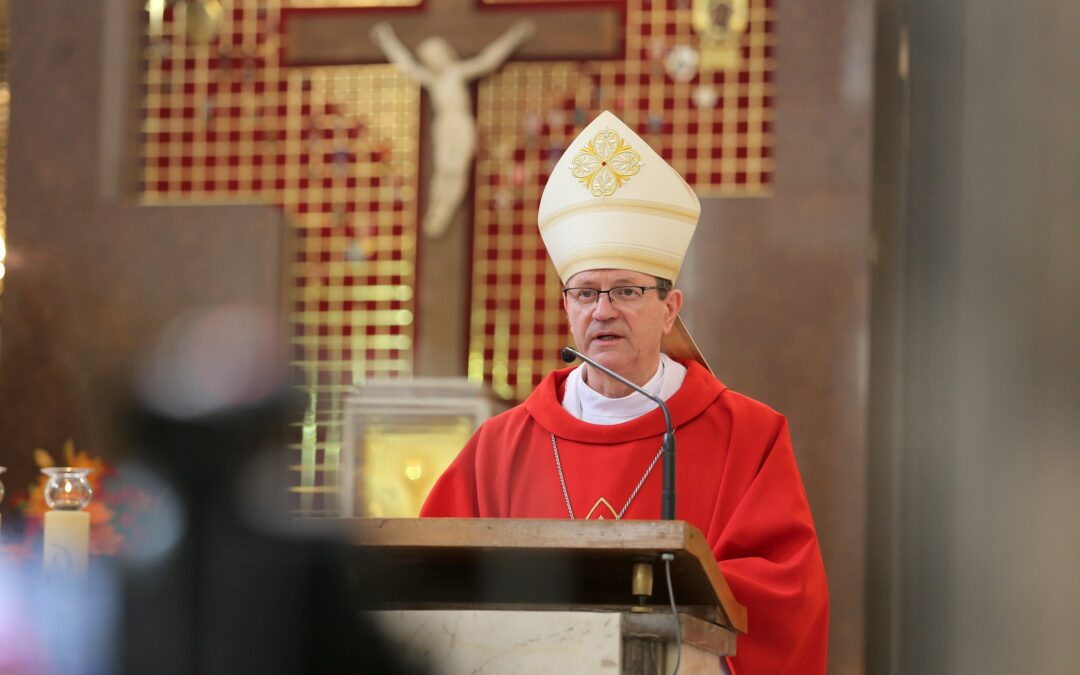Poland’s Catholic bishops have accused the state authorities of “violating the law”, including by seeking to expand abortion rights, improperly treating prisoners, “spreading hate”, and “marginalising the importance of religion”.
The claims were made in a document entitled “In Care of the Homeland” and published this week by the Polish Episcopal Conference (KEP), the main organ of the Catholic church in Poland.
“Tendencies to atheise public life and eliminate ethics from the political sphere are causing concern,” wrote KEP’s social affairs council, which said this had included “examples of breaking the law by state bodies”.
It then listed those examples as:
“improper treatment of those arrested, introducing the ‘right’ to kill a human being by extending the possibility of performing abortion up to the ninth month of a child’s life, departing from moral values in many areas of social life, spreading hatred, promoting antagonisms, managing conflicts in the social space, marginalising the importance of religion, taking away the right to practice faith and eliminating religious symbols from the public sphere.”
The episcopate said that these “negative trends…lead to deep divisions and lack of mutual respect, conflicts, social alienation and ignoring the law”, as well as to “the destruction of our foundations: Christian tradition and national heritage”.
“We therefore appeal to the state authorities to refrain from any actions that cause the degradation of social life,” concluded the statement. “Let us remember that Poland is our common home, and the Christian heritage has been its foundation for centuries.”
Sorry to interrupt your reading. The article continues below.

Notes from Poland is run by a small editorial team and published by an independent, non-profit foundation that is funded through donations from our readers. We cannot do what we do without your support.
The episcopate’s accusations relate to various actions taken by the new, more liberal coalition government that came to power in December. That ended eight years of rule by the national-conservative Law and Justice (PiS) party, which is closely aligned with the church.
The new government has declared its aim to end the near-total abortion ban introduced under PiS. However, it has so far been unable to do so due to disagreements between the coalition partners regarding what kind of law should replace it.
Instead, the health ministry and justice ministry have published guidelines for doctors and prosecutors regarding when abortions can be carried out, with the declared aim of helping women obtain legal abortions.
Some conservative critics have claimed that these guidelines justify late-term abortions. However, the government has noted that they do not introduce any new measures, but simply provide an explanation of what is possible under the existing law, which allows abortions at any time if a mother’s life or health is threatened.
Poland’s government has published guidelines for when and how abortions can be carried out, to ensure that doctors and prosecutors “take the woman’s side” when making decisions.
“If we won’t change the law, we will change the reality,” says @donaldtusk https://t.co/YwJjCrs9vw
— Notes from Poland 🇵🇱 (@notesfrompoland) August 31, 2024
The episcopate’s reference to improper treatment of prisoners is likely to refer to allegations by PiS and its supporters that three high-profile prisoners – two of them former PiS ministers and one of them a priest charged with corruption linked to the PiS justice ministry – have been “tortured” while in detention.
The government has denied claims that those prisoners have been mistreated.
Meanwhile, the ruling coalition has also been repeatedly criticised by the church for changes it is making to the teaching of Catholic catechism classes in public schools, including allowing different year groups to be combined, excluding grades from end-of-year averages, and seeking to halve the number of hours they are taught.
In May, the mayor of Warsaw – who is aligned with the nationally ruling coalition – ordered the removal of religious symbols from city hall. The prime minister, Donald Tusk, while in opposition, declared his aim to remove Christian crosses from schools and parliament.
Warsaw's mayor has banned the display of religious symbols such as crosses from city hall.
He has also ordered officials to respect the rights of same-sex couples and to use people’s preferred pronouns https://t.co/HekDYSIReu
— Notes from Poland 🇵🇱 (@notesfrompoland) May 16, 2024
Main image credit: BP KEP/Flickr (under CC BY-NC-SA 2.0)

Daniel Tilles is editor-in-chief of Notes from Poland. He has written on Polish affairs for a wide range of publications, including Foreign Policy, POLITICO Europe, EUobserver and Dziennik Gazeta Prawna.



















